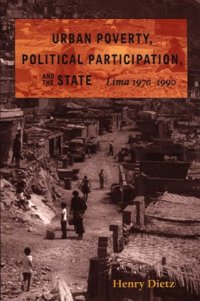
Ebook: Urban Poverty, Political Participation, and the State: Lima 1970-1990
Author: Henry A. Dietz
- Tags: Economic Conditions, Economics, Business & Money, Central America, Belize, Costa Rica, El Salvador, Guatemala, Honduras, Nicaragua, Panama, Americas, History, Peru, South America, Americas, History, Poverty, Social Sciences, Politics & Social Sciences, Ethnic Studies, Specific Demographics, Social Sciences, Politics & Social Sciences, Cultural, Anthropology, Politics & Social Sciences, Urban, Sociology, Politics & Social Sciences, Caribbean & Latin American, International & World Politics, Politics & Government, Politics & Soci
- Series: Pitt Latin American Series
- Year: 1998
- Publisher: University of Pittsburgh Press
- Language: English
- pdf
Low-income urban dwellers, many of migrant origin, now constitute the bulk of the population in most Latin American cities. The sheer weight of their numbers and their multiple needs -- housing, transportation, jobs -- now figure rate the calculations of local and national politicians, all of whom compete for their votes and support. Yet little is known about the political behavior of these groups. For whom do they vote? Do they switch their votes over tone or across types of elections? What sorts of local neighborhood patterns of political involvement exist? If a shift from military to democratic rule takes place, or if an economic crisis occurs, do the urban poor change their political behavior? If so, how?Henry Dietz's Urban Poverty, Political Participation, and the State is the first theoretically informed, comprehensive treatment of these questions for any city or country in Latin America, Dietz worked in six poor neighborhoods -- five shantytown areas and a central city tenement -- from 1970 to 1990. There, he conducted four surveys: in 1971, during the height of Juan Velasco's reform-minded military regime: in 1982, two years after Peru returned to civilian rule under Fernando Belaunde: in 1985, immediately following the election of Alan Garcia and the APRA party; and in 1990, after Alberto Fujimori confronted a collapsed Peruvian economy and the rising threat of the Shining Path.His emphasis is on how Lima's poor have participated politically to increase the probabilities for survival, control, and certainty, over this twenty-year period. His conclusion that squatter settlements are extraordinarily resilient and resourceful, and engage in both formal and informal politicalconsolidation and civil society enhancement, is well supported by his own primary research and many other studies.Urban Poverty, Political Participation, and the State offers an unparalleled longitudinal view of how the urban poor saw themselves and their neighborhoods and how they behaved and organized to provide their neighborhoods with basic goods and services. Grounding research on theoretical notions from Albert Hirschman and an analytical framework from Verbs and Nie, Dietz produces findings that hold great interest for comparativists and students of political behavior in general.
Download the book Urban Poverty, Political Participation, and the State: Lima 1970-1990 for free or read online
Continue reading on any device:

Last viewed books
Related books
{related-news}
Comments (0)